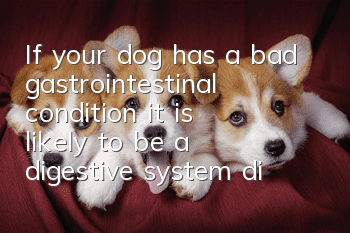If your dog has a bad gastrointestinal condition, it is likely to be a digestive system disease

Dogs often have bad gastrointestinal problems, such as vomiting and diarrhea. Poor gastrointestinal problems are caused by many factors, and it is difficult for parents to judge what the problem is from the symptoms of dogs! What are the digestive tract diseases that dogs are susceptible to? How to help them maintain a healthy stomach.
The process of dogs digesting food
Dogs have a very strong ability to digest food. Their stomachs are irregular pear-shaped, and the hydrochloric acid content in their gastric juices is as high as 0.4% - 0.6%. Hydrochloric acid swells proteins, making them easier to break down and digest. Therefore, dogs have a strong ability to digest high-protein foods, which is also the nature of carnivores.
Dogs can empty all the food in their stomachs 5 to 7 hours after eating, which is much faster than other herbivores or omnivores. Moreover, dogs have larger stomach capacities and relatively shorter digestive tracts, so food is Digestion begins in the stomach, but most food still occurs in the intestines. Dogs have thick intestinal walls and relatively strong absorptive capacity.
Causes of gastrointestinal discomfort in dogs
Eating too much
Dogs are very resistant to hunger, so eating too much will cause discomfort and vomiting in the dog. When your dog vomits, you should observe the state of the vomit. If it is foamy and sticky, it is mostly an esophageal problem. If necessary, you can take some samples to the hospital for testing.
Acute and chronic gastritis
If your dog vomits and the vomit is transparent and white, it means that the vomited gastric juice is gastric juice. This type of vomiting is the most common case of acute gastritis. However, if the dog has no other symptoms after vomiting, don’t worry, just fast for 12 hours. If there are other reactions, go to the hospital for a comprehensive test.
Chronic gastritis refers to chronic gastric mucosal inflammatory lesions caused by different causes. It is mainly characterized by gastric motility and digestive disorders. Its incidence ranks first among various gastric diseases. Dogs suffer from symptoms such as loss of appetite and diarrhea after being sick, and the condition often relapses.
Vomiting, the vomited food is incompletely digested chyme;
Loss of appetite or loss of appetite, increased thirst, and vomiting will occur quickly and worsen after drinking a large amount of water;
Loss of appetite, intermittent vomiting often occurs, the vomitus is sometimes mixed with a small amount of blood, and reverse vomiting often occurs;
Often have symptoms of indigestion such as hot air and diarrhea;
Small intestinal obstruction
Small intestinal obstruction is an acute abdomen disease in dogs, often caused by small intestinal obstruction.Mechanical obstruction of the intestinal lumen or irreversible changes in the normal position of the small intestine, such as intussusception, entrapment, torsion, etc. In addition to causing intestinal blockage, small intestinal obstruction is also accompanied by local blood circulation disorders.
Early stage: vomiting, abdominal swelling, abdominal pain, and inability to defecate;
Late stage: progressive abdominal pain, body temperature will rise, weakness and other symptoms, and sometimes shock;
Gastric torsion
Gastric torsion is also one of the more common digestive tract diseases. Clinical studies have found that when there is a huge external force that shakes the stomach, it may turn over, forming gastric torsion.
Pet dogs with gastric torsion will have difficulty breathing because their stomachs will be bloated
Pet dogs with gastric torsion will also suffer from abdominal pain, and the dog will become restless due to abdominal pain
Enteritis
Dog gastrointestinal problems are definitely related to diet. Enteritis is caused by damage to the intestinal mucosa and inflammation of its deep tissues caused by eating unclean, cold or rotten food, as well as irritating drugs or foreign bodies. Young dogs have fragile stomachs, so enteritis has become a common disease for them, and they are prone to symptoms of vomiting and diarrhea.
Often lie on your stomach on the cold ground or do "praying posture" with your elbows and sternum supported on the ground;
Depression, decreased appetite, indigestion;
- How to read the signs of illness in your dog?
- What does it mean when a dog whines?
- Pimples on dogs
- What are the symptoms of toxoplasmosis in dogs? Take a look!
- Why can't the dog bark?
- How to teach a dog to go to the toilet, dog toilet training methods!
- What should I do if my dog doesn’t want to take a bath?
- How to train a Poodle to stand and walk? Common training methods for Poodles!
- How to save your dog from canine distemper
- Can’t you train a Husky? Husky training tips!



